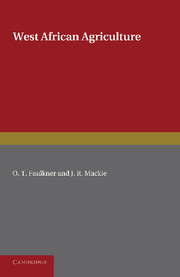Book contents
- Frontmatter
- Contents
- Preface
- PART I GENERAL
- PART II CROPS AND STOCK
- Chapter 9 The Oil Palm
- Chapter 10 Cocoa, Kola, Coconuts, Rubber
- Chapter 11 Cotton, Groundnuts, Benniseed, Ginger
- Chapter 12 Cereal Crops: Maize, Guinea Corn, Millets, Rice
- Chapter 13 Root Crops and Minor Food Crops: Yams, Cassava, Sweet Potatoes, Coco Yams, Beans and Cowpeas, Bambara Groundnut, Onions and Vegetables
- Chapter 14 Livestock
- Index
Chapter 10 - Cocoa, Kola, Coconuts, Rubber
from PART II - CROPS AND STOCK
Published online by Cambridge University Press: 05 June 2016
- Frontmatter
- Contents
- Preface
- PART I GENERAL
- PART II CROPS AND STOCK
- Chapter 9 The Oil Palm
- Chapter 10 Cocoa, Kola, Coconuts, Rubber
- Chapter 11 Cotton, Groundnuts, Benniseed, Ginger
- Chapter 12 Cereal Crops: Maize, Guinea Corn, Millets, Rice
- Chapter 13 Root Crops and Minor Food Crops: Yams, Cassava, Sweet Potatoes, Coco Yams, Beans and Cowpeas, Bambara Groundnut, Onions and Vegetables
- Chapter 14 Livestock
- Index
Summary
In British West Africa cocoa is grown only in a part of the Gold Coast and in the south-western part of Nigeria. The tree needs a climate which is humid for the greater part of the year. If the dry season is long or very severe cocoa will not succeed: its sensitiveness in this respect is clearly seen in places on the borders of the cocoa belt. There cocoa will flourish in any small valley where the trees are sheltered and the atmospheric humidity conserved a little in the dry weather, while, if planted on level ground nearby, it soon dies. Again, investigations in Nigeria indicate that cocoa is very sensitive to soil acidity, and that this factor practically rules out cocoa cultivation in a large part of Southern Nigeria. On the soils of the “Delta” provinces, which are commonly highly acid, many unsuccessful attempts to grow cocoa have been made in the past by native farmers and on the Government farms. Here and there, where there is a patch of soil that is less acid than usual, the trees may live for a few years, and bear a small crop; but more commonly in this area they die even before coming into bearing. It is just possible, though not very probable, that cocoa might be grown successfully on this soil, if it were periodically heavily limed, and this is now being tried experimentally.
The native cocoa planter does not clear and stump the land on which he proposes to grow cocoa so completely as is customary on estates. But even he stumps the land more thoroughly for cocoa than he does for other crops; and experiments on our Government farms in Nigeria confirm that this is necessary. When possible, forest land is used for establishing cocoa plantations, because there is a less vigorous regrowth from forest stumps than from those of secondary bush. After the land has been cleared, food crops are planted, and cocoa seeds sown “at stake” through the food crops. Successive food crops are grown for three or four years, and are weeded when necessary; but no cultivation is given specially for the young cocoa.
- Type
- Chapter
- Information
- West African Agriculture , pp. 105 - 116Publisher: Cambridge University PressPrint publication year: 2013



